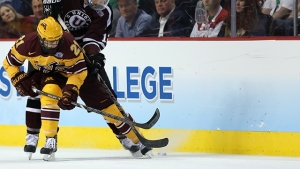 After missing 19 months of hockey from two separate knee injuries, Connor Reilly is now ranked in the top 25 for goals scored in NCAA Division I hockey this season. As a member of the University of Minnesota men’s hockey team, Reilly started the 2014-15 season with a unique kind of passion and determination.
After missing 19 months of hockey from two separate knee injuries, Connor Reilly is now ranked in the top 25 for goals scored in NCAA Division I hockey this season. As a member of the University of Minnesota men’s hockey team, Reilly started the 2014-15 season with a unique kind of passion and determination.
Reilly was a top recruit coming out of his final year of junior hockey when his left knee flared up requiring surgery. Reilly sought out Dr. Robert LaPrade to repair his injured left knee. After seven months of intensive rehab, Reilly was cleared to play. Under the watchful eye of his trainer, Reilly stepped into Ridder Area where the Minnesota band was practicing. After a few rusty shots, he hit the back of the net cuing the Minnesota fight song, “Minnesota Rouser”. That moment would serve as inspiration for Reilly.
No more than a few weeks later, Reilly had a bad fall tearing the anterior cruciate ligament (ACL) and the medial collateral ligament (MCL) in his right knee. Reilly would now face surgery, recovery and rehab all over again. “Getting on the ice again was a special feeling. It was like my own crowd. That’s why the second
With a successful recovery from his injured left knee, he knew Dr. LaPrade was the right doctor to repair his opposite knee. After surgery, Reilly teamed up with University Minnesota’s athletic trainer, Jeff Winslow and strength coach Cal Dietz for seven months to increase strength and range of motion in his knees and lower body.
Reilly’s twin brother, who also plays for the University of Minnesota, was a great support for Reilly on his road to recovery. “He had a lot of courage,” Ryan said. “He went into these surgeries not knowing if his knee was going to be better. I told him, ‘I’m going to work you hard and get you back and keep pushing you.”
Both injuries took 19 months of hockey away from Reilly before he returned to the ice as a redshirt freshman for the 2013-14 season. Reilly was not operating at full strength, playing minimal minutes and scoring a total of six goals in 37 games. While his knees were fully healed, mentally he was still fighting to return. Each time he touched the puck, Reilly had thoughts of doubt, “I hope”, “I wish” and “I’m not”.
Mental coach Shaun Goodshell facilitated Reilly’s final step toward recovery. The two talked everyday for nearly a month about daily goals and slowly Reilly’s confidence returned with “I can” and “I will”.
Reilly scored his first goal against Boston College on Thanksgiving weekend and has not backed-off since. In the Gopher’s past eight games, Reilly has had seven goals and three assists.
Reilly’s twin brother Ryan said, “It took awhile to get his feet going and get his strength back, but you can tell by the season he’s having he’s really starting to figure it out, with the way he’s scoring goals and moving the puck. We’re really proud of him.”
Read full story here.
